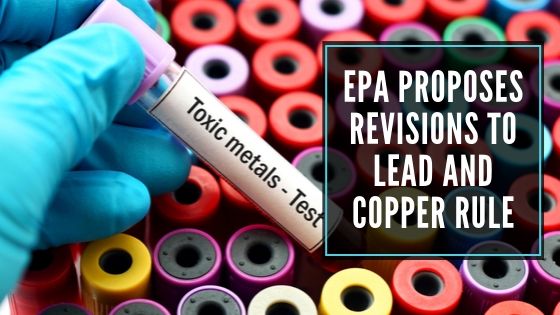EPA Proposes Revisions to the Lead and Copper Rule (LCR)

Lead and copper enter drinking water primarily through plumbing materials. They can be problematic since exposure to these chemicals may cause health problems ranging from stomach distress to brain damage. The Environmental Protection Agency (EPA) has proposed revisions to the Lead and Copper Rule (LCR) to reduce exposure from drinking water in at-risk communities and to ensure that public water systems take a proactive approach by evaluating the treatment and/or replacing lead service lines. The proposed LCR focuses on six (6) areas:
- Identifying the areas most impacted – the requirement to prepare and maintain a lead service line (LSR) inventory.
- Strengthening drinking water treatment requirements – the addition of a trigger level of 10 ppb, which would require communities to be proactive in dealing with lead contamination before reaching 15 ppb. If individual sample results are in excess of 10 ppb, a treatment evaluation (i.e. corrosion control) will be required.
- Replacing lead service lines – initiate Lead Service Line Replacement (LSLR) when: a) customers choose to replace their lines; b) sample results are between 10 and 15 ppb, public water systems will be required to work with the Indiana Department of Environmental Management (IDEM) to set an annual goal for LSLR; and c) sample results are greater than 15 ppb, public water systems will be required initiate LSLR of known LSLs at a minimum replacement rate of 3% to 7% annually.
- Increasing sampling reliability – improved sampling procedures (i.e. wide-mouth bottles, eliminate aerators and flushing, etc.) and higher-frequency sampling.
- Improving risk communication – expedited notice of lead levels to homeowners and outreach to inform the public of LSL locations.
- Protecting children in schools and childcare facilities – require community water systems to sample childcare facilities.
Additional information on EPA’s Proposed Revisions to the Lead and Copper Rule can be found at the link below:
https://www.epa.gov/ground-water-and-drinking-water/proposed-revisions-lead-and-copper-rule
Commonwealth has successfully applied AWWA C810 procedure in prioritizing locations at risk and likely requiring remediation of lead lines. This approach has been approved by the SRF-IFA with resultant grant funding for said replacements and provides an appropriate process for the replacement of these assets. We can assist you in preparing for revision to the LCR through the assembly of a line replacement prioritization summary and evaluation of prudent corrosion control practices.
For additional information, please contact Brady Dryer, Commonwealth’s Compliance Manager.
Brady Dryer
E-mail: Bdryer@contactcei.com
Phone: (317) 888-1177
